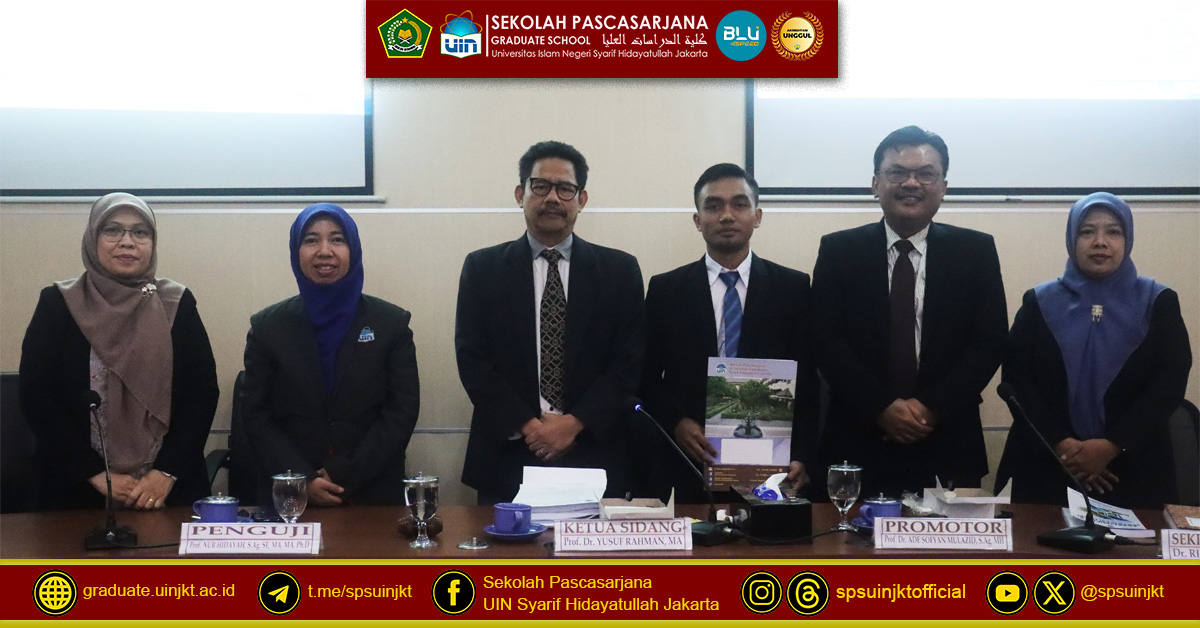Abdul Wahid Wathoni's Thesis Exam, Exclusivity of Halal Certification
SPs Theater Room UIN Jakarta, SPs NEWS: The Graduate School of Syarif Hidayatullah State Islamic University Jakarta held the 2762nd Thesis Exam in the SPs Theater Room of UIN Jakarta, on Tuesday, July 15, 2025 with candidate Abdul Wahid Wathoni.
Abdul Wahid Wathoni is a student of the Master of Islamic Studies study program with a concentration in Islamic Economics. Abdul Wahid wrote a thesis entitled "Exclusivity of Halal Certification: An Analysis of the Resistance of MSME Actors in Gili Trawangan Lombok"
This research specifically highlights the attitudes and views of Micro, Small, and Medium Enterprises (MSMEs) in Gili Trawangan towards halal certification, as well as the crucial role of stakeholders in shaping the economic orientation of business actors. Using sociological and anthropological approaches, Wathoni conducted field research with primary data obtained from in-depth observations and interviews. Secondary data, such as journals, books, and related regulations, also enrich thematic analysis used to identify resistance patterns of MSME actors.
Abdul Wahid argued that halal certification, with its formalities and complexity of procedures, has actually become an exclusive regulation for business actors in Gili Trawangan. This exclusivity, according to him, is not just a resistance to formal regulations, but a manifestation of the economic-cultural orientation shaped by market dynamics and power relations between stakeholders. This means that halal products that have been firmly rooted in the norms and culture of the local community are considered more relevant and accommodate their business needs in plural tourist destinations.
In this context, Abdul Wahid's research highlights the role of tourists as market-setters who indirectly shape the business logic of business actors. The influence of tourists is even considered more dominant than the influence of institutions such as the government or halal companion institutions in influencing the decisions of MSME actors. Halal certification, for them, is often seen as a bureaucratic instrument that is irrelevant to the needs of local businesses in Gili Trawangan.
This thesis also provides criticism of studies that claim the inclusivity of halal certification. In contrast to the view of Chong (2021) who stated that halal certification is accepted across religious groups as a global quality standard, Abdul Wahid found that in the context of Gili Trawangan, certification is actually a symbol of non-contextual norm segregation.
This research not only complements, but also expands the argument of Syafiq Hasyim (2022) who states that halal certification has evolved into an economic commodity. Wathoni added that in areas with secular market structures, halal certification can even cause socio-economic alienation for small business actors. This thesis is expected to make a significant contribution to the formulation of a more contextual and inclusive halal certification policy in the future.
Abdul Wahid Wathoni successfully defended his thesis under the guidance of Prof. Dr. Ade Sofyan Mulazid, S.Ag, MH, and was tested in front of a board of examiners consisting of Prof. Dr. Yusuf Rahman, MA, Prof. Dr. Ade Sofyan Mulazid, S.Ag, MH, Prof. Nur Hidayah, S.Ag, SE, MA, MA, Ph.D and Dr. Yuke Rahmawati, MA.
After paying attention to the thesis writing, the comments of the examiner team and the candidate's answers, the examiner team determined that Abdul Wahid Wathoni graduated with the predicate of Laude. Abdul Wahid Wathoni is the 2762nd Doctor in the field of Islamic Studies, in the master's program of the Graduate School of UIN Syarif Hidayatullah Jakarta.(JA)

